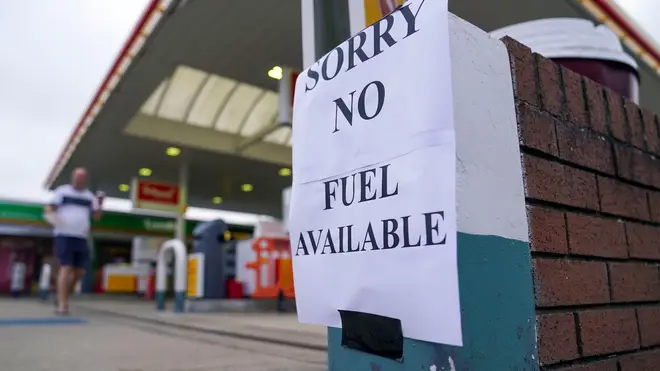
Ian Payne 4am - 7am
27 September 2021, 15:41

There have been scenes of panic buying of fuel across England sparked by fears of disruption to supply chain. For days now, long queues have developed at petrol stations, with pumps running dry.
It all began last week when BP warned the Government it would not be able to fulfil all deliveries due to HGV driver shortages.
This caused a panic and led to a spike in demand, which further exacerbated the supply worries.
READ MORE: Ambulance driver bombarded with abuse on petrol station forecourt while filling up
READ MORE: 'You couldn't pay me enough': Lorry driver explains why no one wants to drive trucks in UK
The shortage of HGV drivers is a widespread issue, with supermarkets warning for months that deliveries are struggling to get through.
But alongside this, the Government has told companies they should be training up British drivers, rather than relying on EU ones as they had done before.
Training takes several months and the DVLA had a huge backlog of people wanting to take a test.

Motorists share thoughts as queues build across the country in petrol shortage
Yes. There is no issue with the amount of fuel going through refineries.
Oil giant ExxonMobil, which operates Esso forecourts and runs the UK's largest refinery, said it is operating as normal and has "strong supply" to distribution sites.
The problem began with getting it to the pumps, and they are now having to react to the latest surge in demand.
Gordon Balmer, executive director of the Petrol Retailers Association, told LBC some petrol brands are seeing as many as 90% of their sites running dry.
He said: "We did a straw poll yesterday morning of a number of our members who have around 200 sites between them.
"Fifty per cent of those we spoke to said their sites were dry and some actually said 90 per cent of their sites were dry, so it is on a company-by-company basis and almost on a brand-by-brand basis because some oil companies are still relatively okay in terms of deliveries."

Petrol Retailers Association boss says 5k drivers might not be enough
Forecourt owners will be hoping the initial rush to the pumps will soon ease and supply can get back to manageable levels.
Operators have suggested that drivers can only stock up on a limited amount of fuel, which should allow the shortage to subside more quickly than supply problems seen at supermarkets at the start of the pandemic.
The Government has said competition laws will be scrapped temporarily, so companies can better liaise to deal with any shortages.
Reports also suggested that drivers from the Army could be drafted to help with deliveries, although this was swiftly rebuffed by the Environment Secretary George Eustice.
Mr Eustice has said the Government has "no plans at the moment" to use the Army to drive petrol tankers, telling broadcasters: "We always have a Civil Contingencies section within the Army on standby - but we're not jumping to that necessarily."
He called on motorists to stop "panic-buying" petrol and return to their normal pattern of purchasing, insisting there was not a shortage of fuel and blaming motorists for filling up when they did not need to for petrol stations running dry.
"The most important thing is that people buy petrol as they normally would. There isn't a shortage. There have been some shortages of HGV drivers getting petrol to forecourts but actually that is quite limited," he added.

Shelagh reads out moving messages from LBC listeners amid fuel crisis
London Mayor Sadiq Khan told LBC the shortages will continue for the "foreseeable future" - with shortages at pumps and long queues expected for the next few days "at least."
Mr Khan said: "I think for the next few days at least there is going to be a shortage of fuel. My message to those who don’t need the fuel is 'please don’t fill up your tank if you don’t need to'."
In the longer term, although some have said the Government was too slow to deal with the HGV driver shortage, several changes have now been brought in which ministers hope will streamline the process and get more drivers qualified and on the road.
The sector has already started paying drivers more and signing on bonuses.
But some warn this could eventually lead to higher prices for consumers as businesses pass on the increased costs.

Sadiq Khan urges those who don't need fuel not to fill their tanks
EG Group has introduced caps on spending per driver, limiting fuel purchases to £30 in order to support its supply, "due to the current unprecedented customer demand for fuel and associated supply challenges".
Esso apologised to customers after some pumps ran dry of petrol and diesel.
A statement by Shell, ExxonMobil and other industry bodies said the pressures on supply were the result of "temporary spikes in customer demand".
Partly. The HGV shortage is global but the UK has felt the pain more acutely because thousands of drivers from the EU left the country during the pandemic and did not return. Brexit rules prevented them from taking up vacant positions.
The Road Haulage Association estimated last month that 14,000 EU drivers left during the pandemic, with only around 500 of these returning.
Some argue that being part of the EU meant wages in the sector were depressed for several years, as supermarkets squeezed suppliers.
Covid-19 closed HGV testing sites, causing a backlog in those looking to take the test. There is also an ageing workforce and the long hours with low pay - compared with rates elsewhere in Europe - have also contributed.